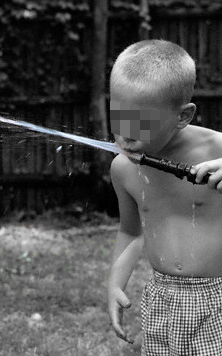Hoses could help Legionnaires' flow
 The humble backyard hose can be a lifesaver in summer, but new research shows it is also loved by the bacteria that cause Legionnaires’ disease.
The humble backyard hose can be a lifesaver in summer, but new research shows it is also loved by the bacteria that cause Legionnaires’ disease.
University of NSW research has revealed that the hose could be a hot bacterial breeding ground.
Water sanitation expert Dr Jacquie Thomas led an 18-month study into the growth of legionella inside garden hoses, and said she was “surprised” by the results.
Legionella bacteria cause Legionnaires’ disease, a serious and sometimes fatal form of pneumonia. Infection occurs when a patient, typically elderly or with a compromised immune system, inhales water droplets containing legionella.
The organisms thrive in warm, damp environments, with outbreaks linked to spas and pools, fountains and air-conditioning cooling towers.
There have been Legionnaires cases linked to hose use in Brazil and the Netherlands, but Dr Thomas’ study is the first to examine legionella growth in an Australian context.
The study found that legionella thrive inside garden hoses lying in the summer heat, multiplying within host cells called free-living amoebae that amplify their virulence.
Legionella hide inside the amoebae to evade water disinfection measures, and the summer heat spurs their growth under conditions Dr Thomas describes as a “microbial soup”.
“We were actually quite surprised at just how dense the populations of both the amoeba and also the legionella were within the hoses,” Dr Thomas said.
The legionella grow within microbial slime on the inside of the hose, called a ‘biofilm’
The biofilm is a “complex architecture of microorganisms” which dislodges in fragments and spurts out with the water when the tap is turned on.
Dr Thomas’ modelling showed that the potential legionella concentration within the aerosols of a hose is comparable to that seen in Legionnaires outbreaks from public spas.
The heat is key – legionella grow at between 25-42 degrees – while the amoebae switch on genes which make the bacteria “more virulent and more pathogenic” than ever.
Though the study only examined two hoses, Dr Thomas said it was part of a growing body of evidence suggesting “a potential source of transmission that needs to be looked at further”.
“There’s definitely enough literature or evidence to warrant larger studies of garden hoses,” she said.
Until then there are a few simple measures to take to minimise the risk.
“Bacteria need water, if you hang up the garden hose to drain it will reduce the opportunity for the pathogens to regrow,” Dr Thomas said.







 Print
Print